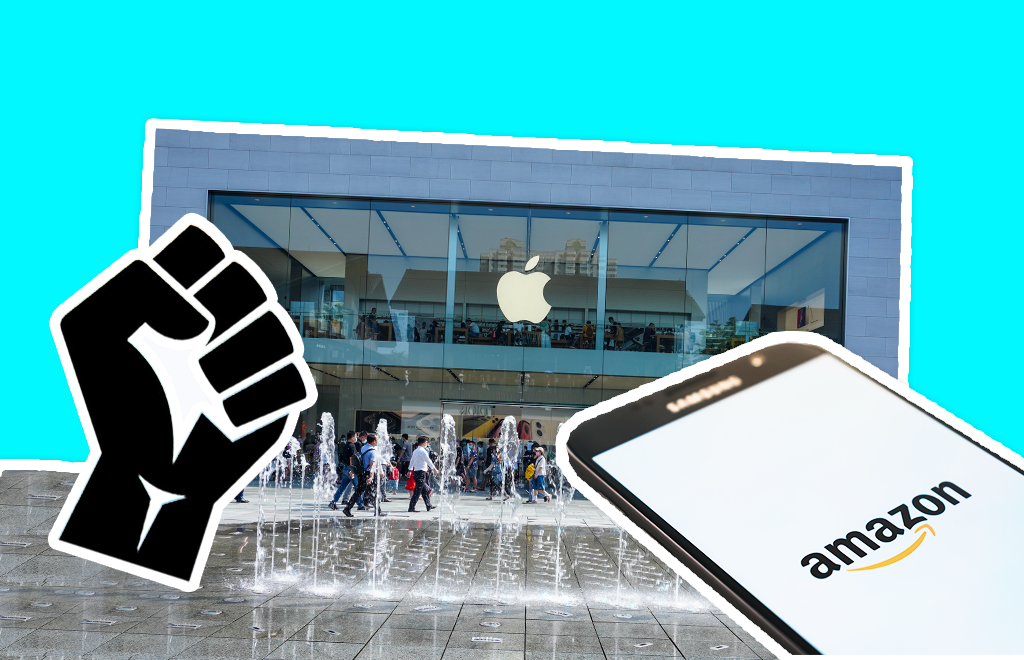In the last decade and particularly in the last two years since the pandemic began, we’ve seen rapid changes to the economy. With both worry over and embrace of the “great resignation,” the continued dominance of Big Tech, and a resurgence of labor organizing alongside burgeoning employee power in new sectors – such as that built by gig workers – tech accountability isn’t just happening in policy circles: It’s being built by tech workers themselves.
Who are tech workers and how are they organizing?
Tech work can mean many things; from software developers to warehouse workers, the employees behind Big (and little) Tech are instrumental to the national and global economy. As of 2021, the tech industry in the United States employs over 12.2 million people, accounting for approximately 10% of the country’s GDP. From engineers to warehouse workers, these employees are instrumental in our evolving technological economy. Tech workers are computer scientists, IT and telecommunications workers, software engineers, designers, project managers, gig workers, and content reviewers, who are on the front lines reviewing graphic and hateful information to keep platforms safe. The functional role of tech workers varies.
After many salaried workers were laid off at the start of the pandemic, a lot of work has shifted onto contractors and gig workers, who hold limited collective bargaining rights. For example, gig workers offer the services that make Uber and Doordash, well, Uber and Doordash. The gig economy has transformed Big Tech beyond dominant social media platforms, which also rely on other classifications of workers to carry out content moderation and data analysis. All of them, from the highest-paid to hourly workers and contractors are critical to the astronomical profits of Big Tech.
At first, new Silicon Valley startups lured the smartest minds with promises of high pay and an equitable work environment. To the delight of their superiors, salaried tech workers bought into Silicon Valley’s idealized world of the “pampered tech worker,” which clouded organizing efforts. For years, these workers dismissed bargaining efforts, arguing that they’re already treated well and don’t need a union to advocate for them. If no one in the room had anything to complain about, why would anyone go through the trouble of starting a union?
Recently, tech companies’ efforts to mask their dark underbelly have come undone, largely because of brave whistleblowers who went public about their company’s sexual harassment, racial discrimination, and unfair labor practices. Furthermore, labor no longer comes solely from savvy engineers with advanced degrees. Work is now divided between salaried workers and contractors, the latter of whom are far more vulnerable to exploitation. Following the election of Donald Trump, many employees of Big Tech began to question how their labor had inadvertently contributed to the problems with the information ecosystem that Trump then rode to the presidency.
Growing numbers of employees have gone public about racial and gender discrimination, corporate surveillance, and grueling working conditions. In 2018, Google employees staged a walkout in protest of forced arbitration and coverup of sexual harassment. Walkouts, strikes, and other forms of protests helped lay the ground for future organizing work. In 2020, Ifeoma Ozoma, a former Pinterest employee, went public with allegations of mistreatment and racial discrimination. She then led the fight to pass the Silenced No More Act in California and then in Washington to allow survivors of workplace harassment or racism to speak about their experiences without fear of violating a non-disclosure agreement.
Groups like Coworker support worker organizing to create culture change among the highly paid and privileged tech workers who are concerned about the decisions made by Big Tech executives, especially regarding tech’s use by police, border patrol, and the military. Alongside longstanding workplace woes – overtime pay, benefits, working conditions, harassment, etc. – tech workers, particularly those in the most precarious roles often filled by contractors and other temporary workers, are uniquely subjected to issues surrounding algorithmic bias, surveillance tools, and content moderation.
Throughout these victories for employees’ rights, workers discussed unionization to give themselves a louder voice. Now that tech workers are seen as more than just computer scientists, and the reality of the struggles of many tech workers have gained more prominence, unions are necessary to prevent the exploitation of gig and contracted workers, as well as ensure workplace safety.
Shifting culture of tech workers
Before the pandemic, the tech sector and media built off of the wave of Big Tech quietly buzzed with union activity to call out workplace discrimination, maintain a healthy work environment, and build the framework for future organizing efforts. In 2019, employees at BuzzFeed, Slate, Pitchfork, New York Media, and Vox unionized or started the process. In February 2020, Kickstarter joined the Office and Professional Employees International Union (OPEIU) and Instacart employees in Chicago voted to unionize.
The pandemic only exacerbated existing workplace problems. The pay gap increased between tech execs and their workers, especially along gender and race lines. Plus, gender pay parity slowed once COVID-19 hit. Once our work and daily interactions became solely digital, workers were forced to invent, develop, manufacture, and distribute technologies that transform and modernize interpersonal communication.
High-paid tech workers needed to conceptualize and develop new communications tools, but low-paid gig and e-commerce fulfillment employees became frontline workers. Amazon union efforts, for example, began with fulfillment workers realizing their labor was necessary to provide water, food, toilet paper, and other essential goods when it was unsafe to shop in person. Once these workers realized their own value, they started exploring possibilities for building power.
Modern tech labor movement
With the help of social media (thanks Big Tech!), worker exploitation came to light and drummed up public support for unionization. According to Wes McEnany, director of the Communication Workers of America’s Campaign to Organize Digital Employees (CODE-CWA), most union activity occurs during periods of social change or unrest.
Small, progressive organizations (Blue State Digital, Mobilize, Glitch) comprise some of the first tech unions. Their goal wasn’t necessarily to a single issue, but rather to codify workers’ rights and preserve a safe working environment, especially as digital organizing took the place of traditional canvassing in the 2020 election. Their struggles and victories laid the groundwork for larger tech and media unions.
As of July 2021, nearly 50% of tech workers wanted to join a union, which explains why tech companies have offered enhanced benefits to dissuade workers from organizing. But meager pay increases and free pizza (or even locally-sourced on-tap kombucha) can’t replace a people-powered bargaining unit with rights enshrined by the National Labor Relations Board (NLRB).
This past January, hundreds of Google employees voted to form the Alphabet Workers Union in response to employee demands over harassment, pay, and ethics. The minority union only represents a fraction of Google’s 260,000 full-time employees and contractors, but organizers wanted to begin building structure and activism. Two months later, New York Times tech workers certified their union in a landslide vote – 404 to 88 – making it the largest tech union in the country.
According to Antonio Aguilera of Coworker.org, unions can solve different issues for different types of tech workers, but it’s important they work together so higher-paid workers can elevate the voices of contractors and fulfillment workers. A large portion of Coworker’s union organizing has focused on uniting tech workers across the salary spectrum and encouraging high-paid – and more privileged – workers to leverage their influence on behalf of low-paid – and more precarious – workers. Other recent tech organizing efforts have targeted police, U.S. Customs and Border Patrol, and the U.S. military, who use tech products for surveillance.
And it’s no surprise that Liz Shuler, the Secretary-Treasurer of the American Federation of Labor and Congress of Industrial Organizations (AFL-CIO), believes that the American labor movement’s next frontier is the tech industry. “What we are seeing in the tech sector is workers rising up. You look at companies like YouTube, Google, Apple. Their workers have been speaking out. …You don’t have the collective power that you have when you have a union, and I think tech workers are starting to connect the dots,” she said in a December 2021 press conference.
Unionization can’t occur unless workers recognize and build solidarity around their positions within larger industries and class systems. Seeking longer breaks and higher hazard pay, workers at a Staten Island Amazon facility made history when they won their union drive a few weeks ago. Not only was this a giant victory for the labor movement, but it demonstrates how expansive the “tech workers” label actually is. Amazon Labor Union president Chris Smalls said that workers at over 100 Amazon facilities across the country have contacted him about unionizing.
Recently, more than 50 Starbucks locations across the country voted to unionize. Retail workers at Apple stores have been making moves to unionize, despite illegal anti-union discouragement from top execs. There’s an undeniable renaissance in the labor movement, but unionization in the tech industry remains an uphill battle. After all, they’re up against companies that control the flow of information and shape our lives in ways that were inconceivable just years ago. Still, even the smallest efforts chip away at tech companies’ concentrated power and create a more equitable and transparent environment that benefits both workers and consumers, which is part of Coworker’s vision to lay the organizing groundwork and bring tech workers of all wages together.








